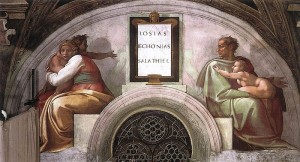
This is the beginning of the Church. The real transition from the Old to New Testament, as we shall see.
https://youtu.be/G_8xKFRxgyA
The Day of Pentecost
| Acts:2-1 | Here then are the essential elements the church then and now should be mindful of:
|
| Acts 2:2-4 | This giving of the Holy Spirit is the Baptism of the Holy Spirit. Mat 3:11 Mark 1:8 & Luke 3:16, Luke 11:13. John 7:38 & 39 Jesus speaks of the Holy Spirit as rivers of living water. John 20:22 was an advance of this baptism. We receive the baptism of the Spirit when place our faith in Jesus Christ. It is not now something we wait on, it is an accomplished fact.It differs with having the Spirit come upon us. These occurrences we seek for daily. This amounts to a yielding to the Spirit and asking for his will in our life. Waiting on the Spirit now consists to yielding to His timing, and being in tune with Him not to get ahead or lag behind.
Sometimes we can only see this in hindsight. This is the relationship of faith in the believer, to step out, not desiring a “fleece” – some sign that we ask of God as to direction, but rather stepping out KNOWING that if the doors are open we go through. And usually, they do. If not, then we chalk the experience up to a no, or wait, I have something better response from our Heavenly Father.
|
| Acts 2:4 | Now, having been filled with the Holy Spirit, they begin speaking in tongues, (here languages), as directed by the Spirit. These are not “unknown tongues”, they were known by the people they were speaking to, as the list following showed, they were unknown only to the Disciples!There is a place for unknown tongues. But what is being exercised here is The Holy Spirit “what to speak in that hour, to quote Jesus. Luke 12:12 |
| Acts 2:5-13 | Part of the Holy Spirits exquisite timing is the gathering of all Jewish men who were able to Jerusalem for three feasts, Feast of Unleavened Bread, Pentecost, (Shavout), and the Feast Tabernacles (Succot). All faithful Jewish men attended these. And they did so via the excellent roadways of the Roman Empire. So that when the church was born, all the conditions were there to allow it to expand rapidly far & wide, as desired by God.Of course that rapid spread would never be or is now, without scoffers, those who lok for a miraculous sign, obviously one here, or those who see this as foolishness. 1 Cor 1:18-21
The countries themselves form a compass around Israel on the Mediterranean.
It was common practice of the day at Synagogue, to include a reading of the mighty works of God; the Red Sea crossing, leading out of Egypt, and other victories given the Jews. In fact, it is often our most powerful testimony, to speak of the mighty works of God in our own lives. They may dispute the Bible, or the Gospel, but they cannot refute your personal testimony! |
Peter’s Potent Portion
| Acts 2:14-16 | He starts the (2nd) greatest sermon ever by dismissing the mocking by refuting the accusation: this was not 21st century America were bars and liquor stores are open at 6 in the morning. It was unheard of to be drinking at 9 in the morning (the third hour). 1 Th 5:7 supports this. Drinking was a nighttime activity for that culture.Rather, he wants to ratchet up this crowd out of the earthy, crowd mentality, to a much higher plane. And he does it the same way we do, appeal to Scripture, appeal to the Bible. Don’t justify it, let it do it’s own work as Isaiah quotes Isa 55:11 and 2 Tim 3:16 |
| Acts 2:16-21 | Quoting Joel 2:28-32, Peter shows they assembled that the moment they are witnessing is a direct fulfillment of Scripture, as great as to being a witness to Neil Armstrong’s setting foot on the moon in 1969! To their as yet not believing eyes, they witnessed the power of the Spirit, which needed to be explained to them, as any good pastor should do.Peter ends the opening part with a Biblical call to salvation. |
| Acts 2:22-28 | Now he quotes Psalm 16:8-11 in an apologetic to show how the plan of God was also freely carried out by their own people. They themselves knew Jesus. It also shows very clearly that the sovereignty of God is in no way at odds with the free will of mankind. They are not in opposition, as this passage clearly shows.Authentication:
Authentication is the way we show we are the person we say we are to someone who doesn’t know us. Almost all of us use passwords or scanners, etc. to prove who we are to people who don’t know who we are. This is precisely why Jesus performed the miracles, many unique, restoring vision (John 9:32) to authenticate He was who He claimed to be, so that if you chose (choose now) to reject that claim, you did(do) so willfully ignoring the facts. The Scripture Peter quotes he explains: |
| Acts 2:29-36 | Peter sets up that the person David was talking about was not David, but one of his descendants v30, the Messiah V31. Peter shows now that Jesus is that Messiah spoken of by David.He then reiterates that is was not Davis in the passage, but Jesus, and then convicts the crowd of being participants-in-fact of that unjust murder, to which God turns into His most glorious act, the salvation of the world! |

